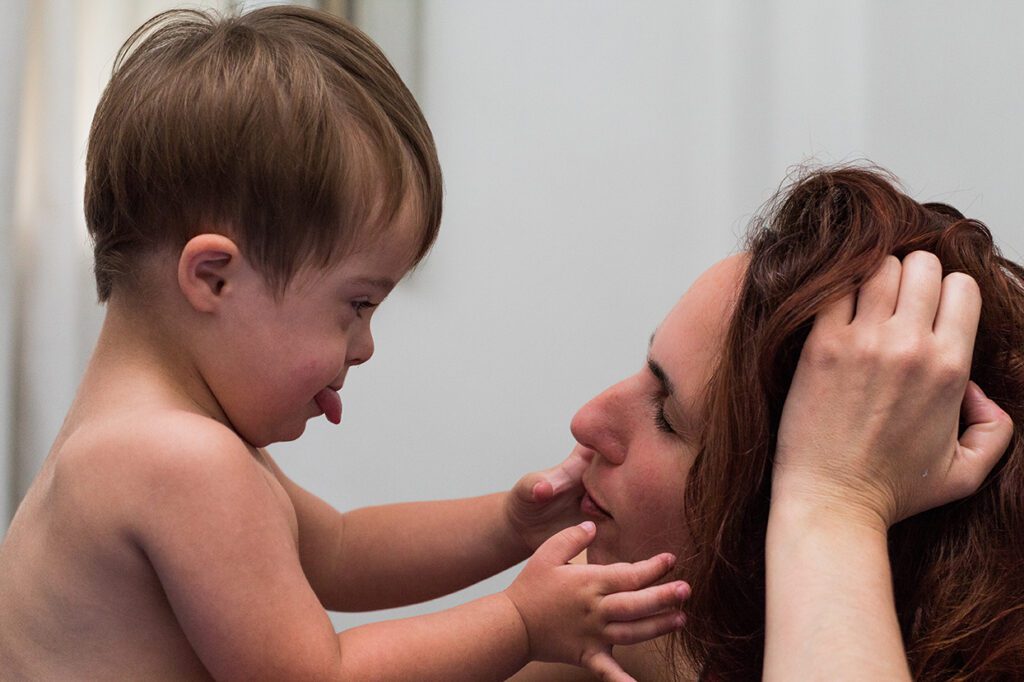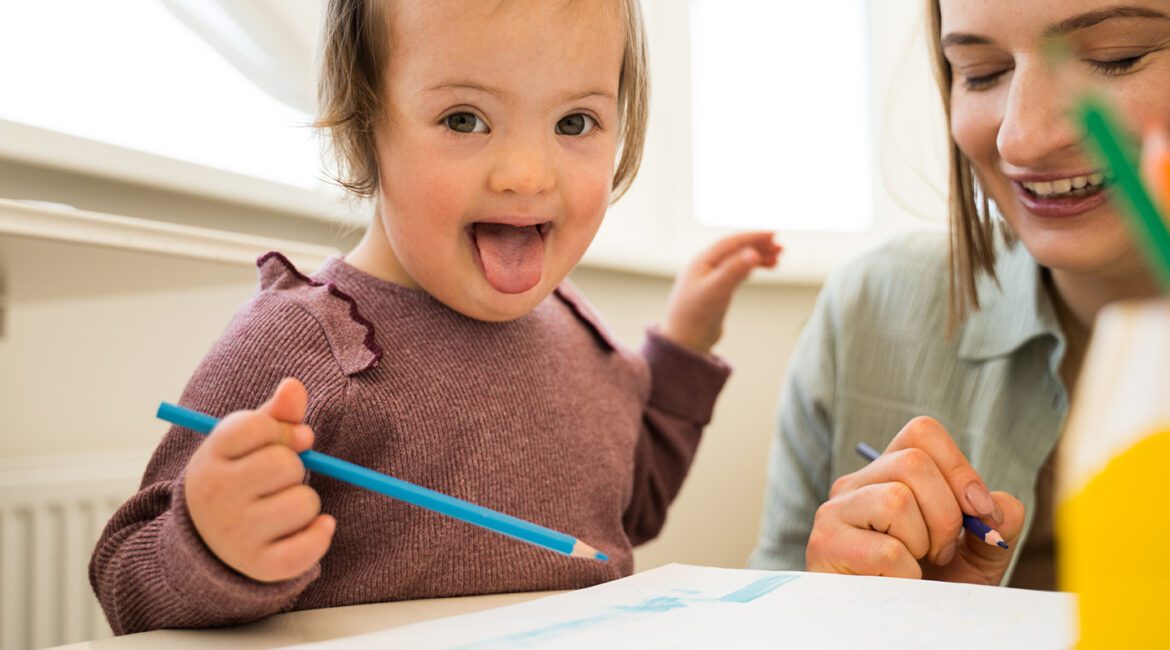A prenatal screening test can unveil a positive diagnosis for Down syndrome. And if such a diagnosis occurs in your family, you may experience a number of emotions. You may find yourself filled with a lot of questions.
Questions like…
Will the baby be ok?
What does this mean for his/her future?
How will this Down syndrome diagnosis affect our family?
As parents, all you want to do is protect your children. And the reality is a Down syndrome diagnosis can change what you have envisioned for your baby’s future – but it doesn’t have to be life-altering. You can become more empowered by becoming educated, connecting to one of many support groups, and knowing the facts.
This article hopes to share a clearer understanding of what Down syndrome is, things you should know as a parent, and valuable information to help answer some of your most immediate questions.
What is Down Syndrome?
Down syndrome occurs when a child is born with an extra copy of chromosome 21. With this extra chromosome, people with Down syndrome are faced with experiencing intellectual and physical challenges, which have an impact on day-to-day living for themselves and their loved ones taking care of them. There are three types of Down syndrome, including Trisomy 21, translocation Down syndrome, and mosaic Down syndrome.
Trisomy 21
This form of Down syndrome occurs in 95% of DS diagnoses, and Trisomy 21 (or T21) is the medical term you hear interchangeably for “Down syndrome.”
Translocation Down syndrome
About 3% of those diagnosed with Down syndrome have translocation Down syndrome. This is when part of or a whole chromosome 21 is present but attaches to a different chromosome. This form of Down syndrome does not have three copies of the 21st chromosome.
Mosaic Down syndrome
Approximately 2% of people with Down syndrome have mosaic Down syndrome. Individuals with this type may or may not have some similar physical features as those with Trisomy 21. Not every cell will have three copies of the 21st chromosome. Some cells will have two copies of the 21st chromosome.
An important thing to know about any Down syndrome diagnosis is that all babies, children, and adults will be different. No two individuals with Down syndrome will have the same physical, cognitive, and socio-emotional symptoms as one another. Every person with Down syndrome is different.

Common Physical Signs of Down Syndrome
While symptoms of Down syndrome can vary widely from child to child, there are common physical characteristics in children with Down syndrome. These may include:
● Distinctive facial features, potentially with the bridge of their nose being flatter
● Palmer crease, which is a crease that extends across the entire span of the hand
● A gap between the big and second toe on their foot, often called “sandal gap”
● White spots that can be located on the iris part of the eye
● Smaller-sized feet and hands
● Almond-shaped eyes
● Decreased muscle tone or looser joints
People with Down syndrome can also experience a delay in reaching developmental milestones where speech therapy and physical therapy can help. These delays are noticed with basic motor skills, balance, writing, and talking.
Other Down syndrome symptoms involve children having a hard time expressing emotions, sensory sensitivities, and communicating.
Possible Health Problems Associated With Down Syndrome
People with Down syndrome have an increased risk for multiple health problems, which parents should be aware of so they can work with their child’s provider during annual screenings to increase the prevention of onset disease. These medical problems can include:
● Gastrointestinal disorders
● Hearing loss & ear infections
● Obstructive sleep apnea
● Heart defects which are often present at birth
● Celiac disease
● Thyroid conditions
● Blood disorders like leukemia
● Eye diseases associated with vision problems
● Obesity
● Increased chance of developing Alzheimer’s Disease
Some of these conditions can be more evident at birth, like certain gastrointestinal disorders or heart conditions requiring surgery right away, while others become more of an issue later in life.
It is important to be aware of more of these serious medical conditions so that parents can talk with their child’s pediatrician and get regular screening tests and check-ups to be proactive regarding their child’s overall health with Down syndrome.

Down Syndrome Diagnosis
A Down syndrome diagnosis typically happens either during pregnancy or at birth through diagnostic tests.
Screening tests can be used as early as 10-11 weeks gestation to help inform parents about their likelihood of having a child with Down syndrome. Prenatal screening tests can include blood tests and an ultrasound, which are noninvasive to the baby. A multiple marker serum screening is a prenatal screening test where a blood sample is taken from the mother to test for a variety of genetic conditions that can cause birth defects as well as the gender of the baby.
Factors such as the mother’s age, results of the blood test, and measurements seen on the ultrasound go into the likelihood of determining if the baby may have Down syndrome or other conditions.
Treatment for Down Syndrome
While there is no cure for Down syndrome, early intervention and supportive therapies can significantly help. There are multiple programs to help enhance the quality of life for people with Down syndrome.
When introduced earlier in life, occupational, physical, and speech therapy can all be used to help improve fine motor, gross motor, and speech skills. Not all children with Down syndrome will need these therapies, but many will require some of them.
Finding support groups and talking with your doctor about useful resources is important.
Support for Parents
The more you understand about Down syndrome, the better you can be well-informed about treatment and care.
Each child with Down syndrome is born with their own personality and unique gifts.
Seeking early intervention and connecting with supportive communities can help provide powerful support systems. As with everyone’s life, it’s a journey. Lots of love, patience, kindness, and advocacy go a long way.
Frequently Asked Questions (FAQs) about Down Syndrome
Can Down syndrome be inherited?
Only 1% of all Down syndrome cases are passed from a parent to a child (or have a hereditary component). So, in the large majority of Down syndrome cases, it does not run in the family. People with Down syndrome are of all different races and ethnic backgrounds.
What is the life expectancy of individuals with Down syndrome?
The life expectancy of people with Down syndrome has greatly improved over time. What has contributed to this increase in lifespan has been due to advances in Down syndrome research, support programs, and better education. Currently, the average lifespan of a person with Down syndrome is about 60 years.
How can parents support a child with Down syndrome?
Parents can support their child with Down syndrome by creating an encouraging and loving environment at home. Accessing early intervention programs and advocating for inclusive education can also contribute to a healthy dynamic between parents and their children with Down syndrome.
Are there community resources for parents of children with Down syndrome?
Many organizations offer support, information, and community for parents of children with DS. It’s a great way to educate yourself and meet others on a similar journey.
Here are multiple DS organizations to check out:
● National Down Syndrome Society
● National Down Syndrome Congress
● Down Syndrome Diagnosis Network
● Down Syndrome Affiliates in Action
You can Google “local Down syndrome organizations” in your community to see how you can participate and make connections.
Be sure to check out our DSA’s parent page to learn more.
